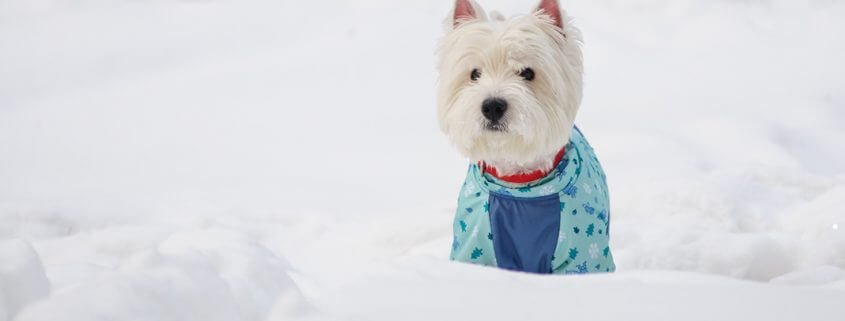Doggy Winter Survival Guide
Dogs love the winter time, for many it means extra cuddles in front of a warm fire with their owner! However, the colder weather presents a few problems for keeping our furry friends safe and entertained during the colder months. Here are a few tips for ensuring your family pet stays happy this winter.
Keep Your Dogs Safe
- Winter walks are fun but the hair around your dogs feet can become clumped with snow. This is very painful for dogs as the snow forms ice balls which digs into the pads of their feet when they walk. Trimming hair around your doggy’s toes helps prevent these ice balls from forming.
- Reflective clothing can be very helpful when heavy snow starts to fall, especially for smaller dogs. The jacket ensures that you can see your canine, especially when they are playing in deep snow.
- Stay away from lakes or ponds, especially when they freeze over. You can never tell how thick the ice is and curious dogs may fall through. On top of the danger of your dog taking a dip, there is also the danger of you falling in when you go to try and help them.
- Winter time means Christmas time, which means lots of opportunity for over indulgence on food. Dogs also love a tasty treat, even if they don’t know the occasion. Try to avoid feeding your dog human food, as this can give them an upset stomach. Be especially careful that your dog doesn’t try to sneak a turkey bone as they can splinter and cause your dog to choke. For more foods to stay away from, see our Canine Christmas Dangers.
- Anti-freeze is very very poisonous to dogs (and cats) as it contains ethylene glycol, which tastes very sweet and causes acute kidney failure when ingested by canines. Make sure that you wipe your dogs paws if they are near an area where it was just used. Try to use anti-freeze that contains propylene glycol, as it is safer if accidentally ingested than ethylene glycol. If you suspect your dog has ingested anti-freeze and is displaying signs of vomiting, sleepy/depressed behaviour, appearing drunk, seizures and fits or difficulty breathing, you should immediately seek the help of a vet.
- Rock salt is abundantly used in winter to de-ice roads for motorists. Unfortunately your pets are likely to accidentally pick it up on their paws when they go outside after it has been used. Rock salt it actually poisonous to cats and dogs when ingested (usually by them licking the rock salt off their paws) as it causes high blood sodium levels in pets. This can lead to increased thirst, vomiting and lethargy (sleepiness) and in extreme cases convulsions and kidney damage. For more information, have a look at the RSPCA’s rock salt information brochure.
Keep Your Pets Warm
- Dogs obviously have a natural protection against the elements, but that doesn’t mean they don’t get cold. Make sure to not leave your dog outside unattended as they can develop frostbite or hypothermia. This is especially important if your dog spends most of its time indoors. If you believe your dog is showing symptoms of hypothermia (muscle stiffness, lack of mental alertness, shivering, weakness, and shallow breathing) you must contact your vet as soon as possible, as left untreated it can cause a coma, or even be fatal.
- Maybe think about opting for some doggy fashion this winter to keep your dog warm. A doggy coat is great for short hair dogs whose natural defenses against the cold are not as strong as long haired dogs. You can also buy doggy boots which help keep irritable ice, salt, and grit off your canine’s delicate paws.
Keep Your Pets Entertained
- Whilst it’s tempting to snuggle up with your furry friend when it gets cold outside, they still need exercise! Don’t forget to stick to your walking schedule, even when the temperature is low.
- If you really don’t like the idea of battling Jack Frost with your canine companion, it’s important to keep them entertained so they don’t go stir crazy inside and start chewing up your furniture. Have some alternatives to outdoor exercise ready. Play hide and seek with favourite toys (or members of the family). Stimulate their nose by getting them to seek scents by hiding treats around the house or a specially made indoor obstacle courses. Or sign them up for a local indoor class where they can socialise with other dogs, top up their training or learn a new skill.
We here at DogFence know that your pet is part of the family and deserves the same amount of safety and comfort as you. These have been some tips to make sure that your pet has as much fun as possible this winter!





